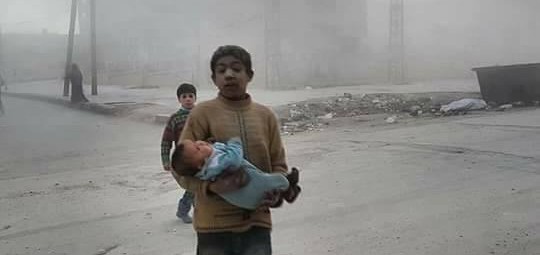PHOTO: A boy carries a slain baby in eastern Aleppo city, November 26, 2016
The editorial board of The Guardian write:
Exhausted parents clutching terrified children in their arms, young people pushing the old in makeshift carts or wheelchairs and families pulling overstuffed suitcases: the scenes from east Aleppo are those of a new exodus. As Syrian government forces move on the last urban stronghold of the anti-Assad opposition, helped by Shia militias from Iraq, Iran and Hezbollah, hundreds of men have been rounded up and disappeared. Their relatives, as well as human rights activists, fear they may already be dead, or have become victims of Assad’s network of jails and torture centres where thousands have been murdered.
The Syrian and Russian onslaught has been going on for weeks. But now it is at a new intensity, as it approaches what may be the end game. A strategy of indiscriminate bombing, terror and destruction, the UN was told, threatens to turn this part of Syria’s second city into a giant graveyard. Syrian army leaflets dropped on the city warn the inhabitants that they must flee, or face annihilation.
Rebel-held Aleppo seems condemned to utter destruction and defeat. Posted on social media, citizens’ desperate messages resemble final pleas, all hope gone. A UN representative has described the situation as a “descent into hell”. US Department of State officials have made it clear that nothing much can be done; western countries have convened an emergency security council meeting, but beyond words of condemnation and warnings of a humanitarian catastrophe in the making – France has spoken of “what could be the biggest massacres of civilian population since the second world war” – the powerlessness of UN institutions is obvious. In London, at Prime Minister’s questions , the Scottish National Party’s Angus Robertson at least got the Syrian crisis into the discussion. Labour again passed by on the other side.
Meanwhile, Russia’s propaganda machine is hard at work alongside the Syrian regime’s, trying to frame these events as the “liberation” of a population described as hostages of Islamic terrorists. This is as false as it is cynical. “Terrorists” is the label attached to the opposition to Assad ever since the outbreak of the 2011 street uprising against his dictatorship – a revolution that morphed into a full-on civil war after the Damascus government decided to deploy military power, including missiles, barrel bombs and chemical weapons, against its own population. By the summer of 2015, President Assad seemed on the verge of being overthrown. Then Russia launched its military intervention – all the while paying lip service to a diplomatic process the US administration pursued to no avail.
Russia’s move was aimed at reversing the war’s dynamics and consolidating its beleaguered ally, President Assad. Entrenched in Syria, with powerful S-400 air defence systems installed, it took advantage of western reluctance to get embroiled in the conflict, at a time when Washington had made plain that its priority was fighting Islamic State (Isis), rather than putting an end to the massacres carried out by President Assad’s forces. Russia has not only turned a blind eye to these atrocities, it has assisted them. In Moscow, officials now indicate that the situation in east Aleppo will be “resolved” by the end of the year. Make no mistake, that means that the estimated 250,000 inhabitants still remaining at the start of this week will be forced either to leave, or face arrest or death.
The fate of rebel-held Aleppo spells the abject failure of the west’s contradictory and piecemeal policies. It is a humiliation for the UN. Its fall will be an unequivocal victory for Russian strategy. Aleppo will join an infamous list of cities whose names are synonymous with mass crimes committed while the world looked impotently on: Srebrenica, Grozny, even Guernica. Once again, it’s never again. The consequences, both for radicalisation and for the balance of power in the region, are hard to fathom exactly. But they will not be good.

